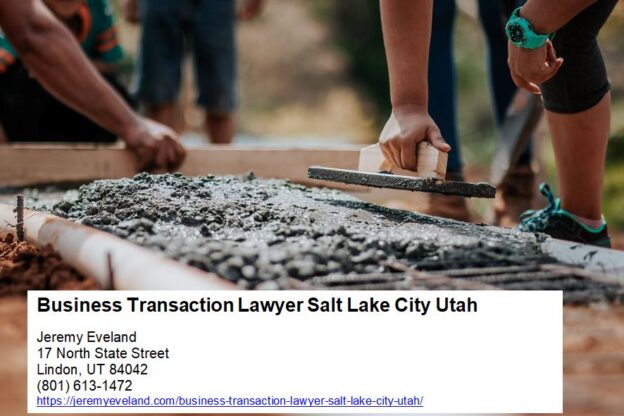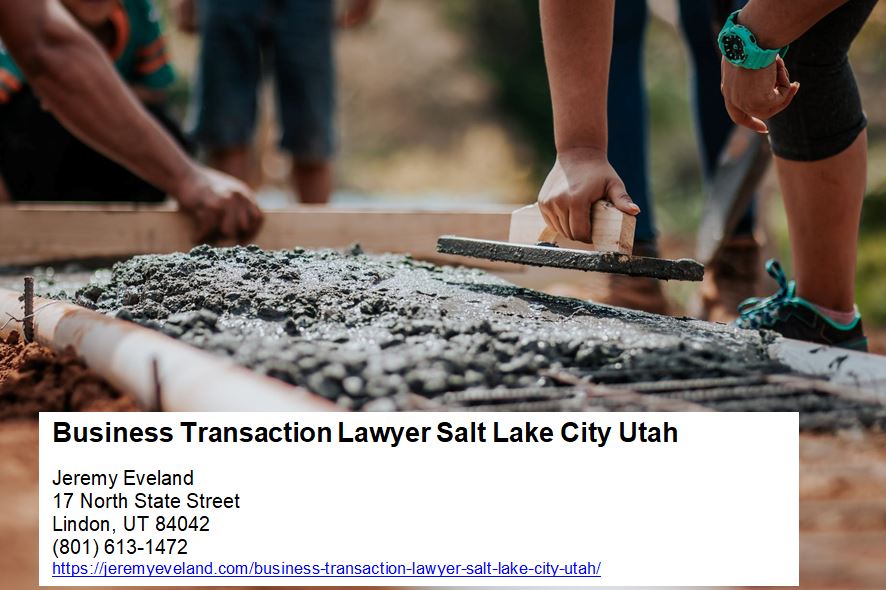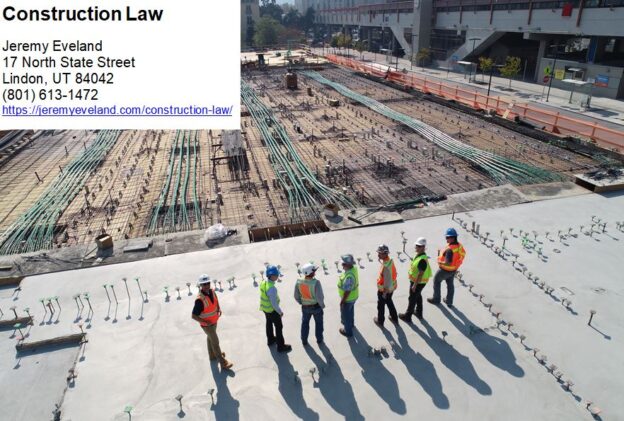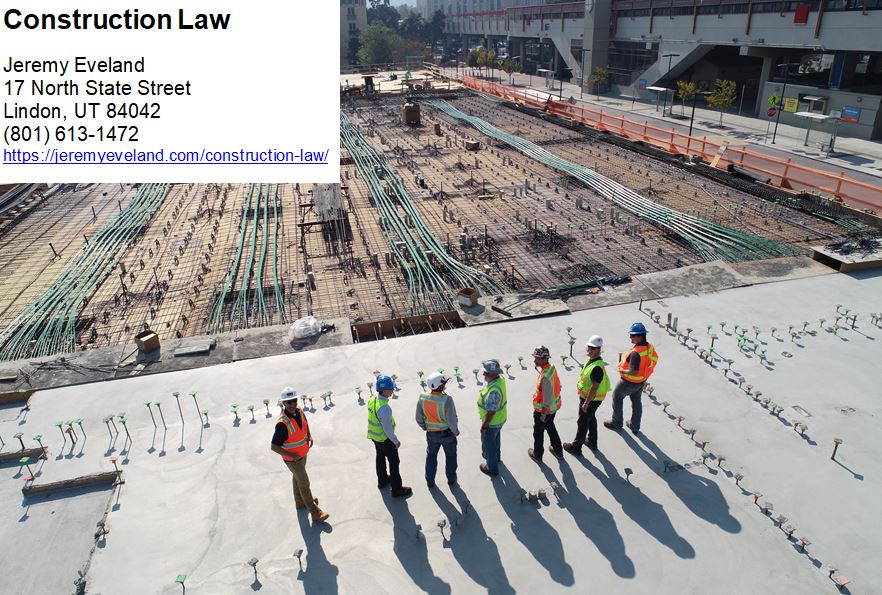Real Estate Attorney
Real estate lawyers are specialized attorneys who specialize in legal matters related to real estate law, contract law, and construction law. Sometimes business law is involved in real estate as well. Attorneys like Mr. Eveland often handle a variety of tasks, including drawing up purchase agreements, negotiating contracts, conducting due diligence investigations, and representing clients in court. Real estate lawyers are vital to the transaction of buying, selling, leasing, and financing of real estate.
Real estate lawyers are responsible for preparing and reviewing legal documents related to the purchase, sale, and financing of real estate. This includes deeds, mortgages, contracts of sale, and other relevant documents. They also provide counsel and advice to clients on the legal aspects of their property transaction. In addition, real estate lawyers may review or prepare documents related to the tax aspects of real estate transactions.
Real estate lawyers also have a role in litigation. This includes representing clients in court regarding disputes over real estate transactions, title issues, boundary disputes, and other real estate related matters. Real estate lawyers must be well-versed in a range of legal issues, including contracts, torts, and commercial law. They must also possess strong research and writing skills.
Real estate lawyers are an important part of the real estate industry. They serve as advisors to clients and help ensure that real estate transactions are legally sound. Furthermore, they provide legal representation in court when necessary. Real estate lawyers are essential to the real estate industry and play an important role in protecting both buyers and sellers.

Quiet Title Actions
A Quiet Title Action is a legal action that is used to establish a clear title for real estate property. This action is used when there is a dispute regarding ownership of a property or a cloud on title due to liens, encumbrances or conflicting claims. In a Quiet Title Action, the court will decide who holds the legal title to the property, thereby removing any questions or doubts about ownership.
The Quiet Title Action is used to eliminate any doubts or uncertainty about the ownership of a property. This is done by having the court adjudicate the title, thereby determining who has the legal right to the property. The action is often used when there is a dispute among multiple claimants regarding the ownership of a property, or when there are liens, encumbrances, or conflicting claims that cloud the title of a property. The court will review the evidence and any arguments presented by the parties involved and make a decision that establishes a clear title to the property.
The Quiet Title Action is an important tool in real estate law as it helps protect the interests of all parties involved in a real estate transaction. By clearly establishing the title of a property, the action helps to prevent any confusion or disputes regarding the ownership of a property. This helps to ensure that the proper parties are protected and that the title to the property is secure. In addition, the action helps to protect the interests of lenders, buyers, sellers, and other stakeholders in a real estate transaction.
Landlord Tenant Law
Landlord and Tenant Law in Utah is complex, and the consequences of not following the law can be severe. If you are a landlord or tenant in the state, it is important to understand your rights and obligations under the law. It is also beneficial to seek the advice of a qualified lawyer for help. A lawyer can help you understand the law and its implications for your specific situation, as well as provide advice on how to best protect your rights. Additionally, a lawyer can provide valuable assistance in negotiating and drafting leases or other contracts, as well as representing you in any dispute or litigation. Hiring a lawyer to help with Landlord and Tenant Law in Utah is the best way to ensure that your rights are fully protected. Mr. Eveland is currently only representing landlords or real estate owners at this time.
Mortgages and Foreclosures
Mortgages and foreclosures in Utah can be a tricky process, particularly if you are unfamiliar with the laws governing them. When faced with foreclosure proceedings, it is important to hire an experienced lawyer who can advise you on the best course of action. A lawyer can provide you with an in-depth understanding of the legal process, as well as the laws that govern the state of Utah. They can also provide the best advice on how to negotiate with lenders and make sure that you are protected throughout the foreclosure process.
In addition to understanding the legal process, a lawyer can also provide sound advice on how to manage your finances and keep your home or business safe from foreclosure. They can also help you fight fraudulent lenders who may be taking advantage of you. By hiring a lawyer, you can rest assured that your rights are protected and that you are getting the most out of the process.
A lawyer can also provide you with advice on how to negotiate with your lender and make sure that your mortgage is kept in good standing. This can help ensure that you do not fall victim to foreclosure and that your credit is not damaged. A lawyer can also help you review the terms of your loan and make sure that you are not being taken advantage of.
Finally, a lawyer can provide you with the support you need during the foreclosure process. Whether it is fighting for a lower interest rate or preventing a foreclosure, a lawyer can provide the best advice for your situation. So if you are facing foreclosure proceedings in Utah, it is essential to hire a lawyer who can provide you with the best advice and support.
Real Property Rights and Regulations
Real property rights and regulations in Utah can be complex and confusing. It is important that individuals understand these rights and regulations before they enter into any real estate transactions so they can make informed decisions. For this reason, it is always a good idea to hire a lawyer to assist with any real estate matters in Utah.
A real estate lawyer can help you understand the different types of rights you have when buying or selling property in Utah, such as the right to privacy, the right to quiet enjoyment, and the right to exclude others. They can also help you understand the various regulations that apply to real estate transactions in Utah, such as zoning laws, building codes, and occupancy requirements.
A real estate lawyer can also help you draft and review any documents related to your real estate transaction, such as purchase agreements, leases, or loan documents. They can also provide advice on any dispute that may arise during the course of a real estate transaction, such as a breach of contract, a failure to disclose certain information, or a failure to comply with zoning regulations.
Finally, a real estate lawyer can help you understand and comply with any laws or regulations related to the transfer and ownership of real property in Utah. This includes understanding the requirements for transferring title, the tax implications of real estate transactions, and the procedures for filing a deed.
Hiring a real estate lawyer is the best way to ensure that you are fully informed and protected when making real estate transactions in Utah. They can help you understand your rights and obligations and ensure that you comply with all applicable laws and regulations.
Real Estate Leases
Real estate leases in Utah are complex documents that require a great deal of understanding of the legal and business implications of a rental agreement. It is important to hire an experienced lawyer to craft and review any leases in the state of Utah. A lawyer is familiar with the laws and regulations that govern such agreements and can ensure that your rights and interests are protected. You don’t know what you don’t know. They can also provide advice on the best way to structure the lease agreement, such as setting a fair rent and other terms that work in your favor.
A lawyer can also help protect you from potential problems due to the complexity of Utah’s real estate laws. This is especially true when it comes to lease termination, which requires the approval of the landlord. A lawyer will be familiar with all of the requirements and be able to ensure that the lease is terminated in the most efficient and legally binding manner.
In addition to protecting your rights, a lawyer can provide a great deal of guidance and advice when it comes to negotiating the lease. They can help to ensure that the agreement is fair and balanced, as well as provide advice on other aspects of the lease, such as the security deposit, maintenance and repair obligations, and more.
Ultimately, hiring a lawyer to craft and review real estate leases in Utah can be a wise decision. Not only can they provide legal protection and advice, but they can also help to ensure that your interests are taken into account when negotiating the lease. This can make all the difference when it comes to avoiding costly disputes or misunderstandings down the road.
Utah Condominium Law
In Utah, Condominium Law is governed by the Utah Condominium Ownership Act, which is a set of statutes that outlines the rights and responsibilities of both condominium owners and developers. This Act grants many rights to condominium owners, including the right to inspect the records of the association, the right to vote in elections and referendums, the right to attend and participate in meetings, and the right to access the common areas and facilities. The Act also provides for the formation of associations and outlines the duties of the association, such as maintaining the common areas of the condominium complex, enforcing the governing documents, and providing notice of meetings.
The Utah courts have issued several decisions and opinions which have further clarified the rights and responsibilities of all parties involved in condominium law. In the 2017 case of Schreiber v. South Valley Estates Condominium Owners Association, the court ruled that an association was not required to provide an owner with access to the common grounds and facilities of the condominium complex until the owner had paid the required assessments. In the 2020 case of Bouchard v. Sunset Ridge Condominiums, the court ruled that an association was not obligated to provide a unit owner with access to the common areas of the complex because the owner did not pay the required assessments.
These cases demonstrate that Utah courts will strictly enforce the provisions of the Condominium Ownership Act and that the rights and responsibilities of all parties involved in condominium law must be respected. It is important for both owners and developers to be aware of their rights and responsibilities under the Act and to ensure that they comply with the governing documents. Additionally, it is important for all parties to understand how the Utah courts interpret the law so that they can ensure their rights and interests are protected.
Real Estate Zoning
Zoning law in Utah is a complex and ever-evolving body of law that governs the use and development of land across the state. The Utah Supreme Court has held that zoning laws are constitutionally permissible so long as they are reasonable and not inconsistent with the state’s public policy. In particular, the court has upheld zoning laws that promote the public welfare and that do not unreasonably interfere with the use of private property. For example, in Utah County v. Peterson, the court upheld a local zoning ordinance that limited the number of residential dwellings on a single piece of land, finding that the ordinance was reasonable and consistent with the public health, safety, and welfare. Similarly, in Salt Lake City v. Jensen, the court upheld a city ordinance that prohibited the operation of a hot dog stand in a residential area, finding that the ordinance was consistent with public safety and welfare. These cases demonstrate that Utah law is concerned with encouraging reasonable zoning regulations that strike a balance between protecting public welfare and respecting the rights of property owners.
Real Estate Taxes In Utah
Real estate tax law in Utah is governed by the Utah Code, which is the official codification of the laws of the state. The Utah Tax Commission administers the laws and regulations relating to real estate taxes. In addition to the state laws, each county in Utah has its own set of local ordinances governing real estate taxes.
In Utah, property taxes are assessed on a tax year basis that generally runs from July 1 of one year to June 30 of the following year. The assessed value of a property is determined by the county assessor and used to calculate the amount of taxes due. Property taxes are due on the first day of the tax year and are delinquent if not paid by the following June 30.
The Utah Supreme Court has held that the assessment of real estate taxes is a legislative function and any challenge to the assessment must be based on statutory grounds. In the case of State v. Taylor, the Court found that the assessment of real estate taxes was valid because it was done in accordance with the Utah Code. Similarly, in the case of State v. Jones, the Court held that the assessment of real estate taxes was valid because it was done in accordance with the county ordinance.
The Utah Supreme Court has also held that a county’s right to assess and collect real estate taxes is not absolute and can be challenged in court. In the case of State v. Larson, the Court held that the county had exceeded its power to assess a property because the assessment was not based on the actual value of the property.
Real estate tax law in Utah is a complex area of the law and any challenge to an assessment must be based on a careful analysis of the applicable statutes and local ordinances. Understanding the laws and regulations governing the assessment of real estate taxes is essential for anyone considering a challenge to an assessment.
Utah Law Use Law
Land Use Law in Utah is a complex and ever-evolving legal field. It is the body of laws that govern the way land may be used, managed, and developed in the state. This includes regulations affecting what types of buildings may be constructed, how land is zoned for particular uses, and how land may be subdivided and sold. In addition, it includes restrictions on the types of activities that may be conducted on the land, such as mining and logging.
The Utah Supreme Court has been a major force in shaping Utah’s land use law. In the recent case of Utah Valley University v. West Valley City, the court held that a local government may not require a university to pay a private developer for certain land use rights. The court ruled that the government may not require a university to pay a developer for rights like the right to build a parking lot or the right to subdivide land. This ruling helps ensure that universities can use their land for educational purposes without having to pay a private developer.
In another recent case, the Utah Supreme Court held that a city may not deny a permit to a homeowner who wants to build a garage on their property. The court said that the denial of the permit was unconstitutional because it did not meet a reasonable “public use” requirement. This ruling serves as an important reminder that government agencies cannot use zoning regulations or other land use restrictions to deny an individual the right to use their own property.
The Utah Supreme Court has made a number of rulings that have shaped Utah’s land use law. These rulings have helped to establish important principles and procedures that are used to determine the legality of land use decisions. In addition, these rulings have helped to ensure that individuals and organizations have the legal right to use their land for their intended purposes without unreasonable interference from the government.
Real Estate Environmental Law in Utah
Real estate environmental law in Utah is a complex legal area that is governed by a wide range of statutes and regulations. The Utah Supreme Court has been at the forefront of interpreting these laws in cases such as Zion’s Bank v. Utah State Board of Equalization, 690 P.2d 194 (Utah 1984). In this case, the court held that the State Board of Equalization was not liable for environmental damages caused by a bank’s construction of a commercial building on contaminated land. The court found that the Board’s assessment of the property for taxation purposes was not sufficient to place the Board on notice of the contamination.
In another case, Utah v. Rockwell International Corp., 940 F.2d 1158 (10th Cir. 1991), the Tenth Circuit Court of Appeals reversed a lower court’s decision that Rockwell International Corporation was liable for environmental contamination caused by its manufacturing operations in Utah. The court found that the state’s evidence of contamination was insufficient to establish liability on the part of Rockwell. Furthermore, the court stated that the state had failed to prove that the contamination was caused by Rockwell’s activities.
In yet another case, Utah v. Envirotech Corp., 937 F.2d 1546 (10th Cir. 1991), the Tenth Circuit Court of Appeals held that Envirotech Corporation was liable for environmental contamination caused by its operations in Utah. The court found that the state had presented evidence sufficient to establish that the contamination was caused by Envirotech’s activities and that the company had not taken adequate steps to prevent or mitigate the contamination.
The cases discussed in this paragraph demonstrate that Utah’s real estate environmental law is a complex and evolving area of law. The courts have been willing to consider the evidence in each case and make decisions based on the specific facts presented. As such, it is important for parties involved in real estate transactions to be aware of their rights and obligations under the law and to consult with an experienced attorney when necessary.
Construction and Development of Real Estate in Utah
Real estate construction and development in Utah is a booming industry, with a variety of laws in place to ensure fairness and safety in the process. From zoning ordinances to contracts, Utah case law provides a unique set of regulations for the industry. In 2004, the Utah Supreme Court established a set of guidelines for developers in the case of Utah Assoc. of Realtors v. City of Sandy, which set forth that developers have to be aware of the zoning ordinances in place in the area they are developing and must be mindful of local zoning regulations when making decisions about their project.
Additionally, in the case of Lefevre v. Sperry, the Court set forth that developers have to make sure that they have all the necessary permits in place before beginning construction on a project, and are responsible for any penalties or fines that may arise due to a failure to comply with local ordinances. Finally, in the case of Rice v. Pearson, the Court established that developers must make sure that all contracts are in writing and properly drafted and executed in order to ensure the protection of both parties. These cases demonstrate the importance of understanding the Utah case law on real estate construction and development, in order to ensure the safety and success of any real estate project.
Utah Title Insurance For Real Estate
Real estate title insurance is an important protection for those who purchase or own real estate in Utah. Title insurance provides protection from losses caused by defects or liens in a property’s title. Title insurance typically covers a variety of losses and liabilities, such as title defects, liens, and encumbrances. In Utah, the courts have recognized the importance of title insurance and have established a body of case law that defines the scope of what is covered by title insurance policies.
For example, in the case of Utah Title Insurance Co. v. Phillips, the Utah Supreme Court held that title insurance did not cover losses arising from a prior deed of trust. The court ruled that title insurance only protects against losses arising from title defects, liens, and encumbrances that exist at the time of the purchase of the property. In this case, the court held that the title insurance company was not liable for losses arising from a deed of trust that was recorded prior to the purchase of the property.
In another case, the Utah Supreme Court held that title insurance does not cover losses arising from fraud, forgery, or false representations. In the case of Utah Title Insurance Co. v. Owen, the court held that title insurance does not cover losses arising from fraud, forgery, or false representations regarding the title of a property. The court noted that these types of losses are not typically covered under the terms of a title insurance policy.
Overall, the case law in Utah has established that title insurance is an important protection for those who own or purchase real estate in the state. Title insurance typically covers losses arising from title defects, liens, and encumbrances that exist at the time of the purchase of the property, but it does not cover losses arising from fraud, forgery, or false representations.
Closing Procedures
Real estate closing procedures in Utah are subject to a variety of state and federal laws. Utah case law provides detailed guidance on how closing procedures should be carried out. In general, the Utah Supreme Court has held that the parties to a real estate transaction must follow all applicable laws and regulations in order to ensure the validity of the transaction. In addition, the court has held that the parties must be provided with sufficient information to make an informed decision.
The Utah Supreme Court has also held that the parties to a real estate transaction must be informed of the title company’s estimated closing costs prior to signing the purchase agreement. This is to ensure that the parties are aware of the costs associated with the transaction. Additionally, the court has held that the title company must provide the parties with a written closing statement that details all associated costs.
The court has also held that the parties must be informed of their respective rights and liabilities before closing a real estate transaction. For example, the court has held that the buyer must be informed of the seller’s right to a deed of trust in order to secure the purchase price. The court has also held that the buyer must be informed of all liens that may affect the title of the property, including tax liens, mortgages, and judgments.
In addition, the Utah Supreme Court has held that the parties must execute all documents related to the closing in accordance with Utah statutes. This includes the deed, deed of trust, and other documents that transfer title or impose liens. Furthermore, the court has held that the parties must follow all applicable laws and regulations in order to ensure that the transaction is valid, including all laws pertaining to the transfer of title and the recording of documents.
Dispute Resolution
Real estate dispute resolution in Utah is governed largely by Utah case law. In a recent case, the Utah Supreme Court held that a tenant was entitled to reimbursement for attorney fees and costs incurred in defending an eviction action. The landlord had brought the action without any reasonable basis and the court ruled that the tenant was entitled to the fees and costs because the landlord had unreasonably pursued the eviction. This case highlights the importance of tenants being aware of their rights and the need for landlords to proceed with caution if they believe there is a valid reason to bring a dispute to court.
The Utah Supreme Court has also held that a tenant may recover damages for breach of contract when a landlord breaches a lease agreement. In such an instance, the tenant may sue the landlord to recover the damages he or she suffered as a result of the breach. This includes damages for the loss of use of the premises and any other consequential damages. Additionally, the court may award attorney’s fees to the tenant if the breach is found to be intentional or willful.
Finally, Utah case law recognizes the right of a tenant to sue a landlord for damages if the landlord fails to fulfill their obligations under the lease agreement. For example, if a landlord fails to make necessary repairs or fails to provide essential services, the tenant may have grounds to sue for damages. In such an instance, the tenant would be entitled to damages for the time spent living in a property that was in breach of the lease agreement.
The Utah Supreme Court has established a strong body of case law that governs real estate dispute resolution in Utah. These cases provide tenants and landlords with an understanding of their rights and the remedies available in the event of a dispute. Such cases also serve as a reminder to landlords to proceed with caution when initiating an eviction action or pursuing any other type of dispute, as they may be held liable for attorney’s fees and other damages if the court finds their actions to be unreasonable.
Real Estate Lawyer Consultation
When you need legal help with real estate in Utah, call Jeremy D. Eveland, MBA, JD (801) 613-1472 for a consultation.
Jeremy Eveland
17 North State Street
Lindon UT 84042
(801) 613-1472
Home
Recent Posts
Business Lawyer
The Utah Uniform Partnership Act
The 10 Essential Elements of Business Succession Planning
Utah Business Law
Mergers and Acquisitions
Advertising Law
Business Succession Lawyer Taylorsville Utah
Business Succession Lawyer West Jordan Utah
Business Succession Lawyer St. George Utah
Business Succession Lawyer West Valley City Utah
Business Succession Lawyer Provo Utah
Business Succession Lawyer Sandy Utah
Business Succession Lawyer Orem Utah
Business Succession Lawyer Ogden Utah
Business Succession Lawyer Layton Utah
Business Succession Lawyer South Jordan Utah
Business Succession Lawyer Lehi Utah
Business Succession Lawyer Millcreek Utah
Business Transaction Lawyer
Business Transaction Lawyer Salt Lake City Utah
Business Lawyer Salt Lake City Utah
What Is An Express Contract?
Antitrust Law
























